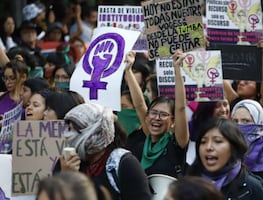Más Información

Secretaria de las Mujeres busca disminuir feminicidios con promotoras de derechos; creará línea para atención a víctimas

Diputada María Teresa Ealy Díaz promueve unidad y tradición en la CDMX; celebra Día de Reyes en la MH

Comisión de Defensa en San Lázaro avala reforma sobre ascensos para médicos militares; busca incentivar especialización

Buscan vinculación a proceso de hotelero por fraude en Baja California Sur; afectados fueron secuestrados al exigir pago

Senado alista mecanismo para garantizar elección judicial tras suspensión del Comité del PJF; Noroña acusa sabotaje
Growing visibility is making the world a bit less dangerous for people with albinism , say victims of violence like Pendo Noni , a shy Tanzanian teenager hunted and attacked for her body parts .
A beauty contest, fashion shows, and media coverage all featuring albino people are helping quell brutal superstition-driven violence in East Africa , said Noni and fellow albino victims visiting the United States for medical treatment.
Noni, 18, lost her right arm in Tanzania, where superstition says people with albinism are ghostly curses who bring bad luck .
Their body parts are valued in witchcraft and can fetch a high price
.
At least 75 albinos were estimated killed in Tanzania between 2000 and 2015 , according to the United Nations , which says that number is just a fraction of the total as most are secretive rituals in rural areas.
, a charity for people with albinism , says since 2006 , more than 520 attacks have been recorded in 28 countries . Tanzania has the most, with more than 170 recorded attacks .
The U.S. visit is the third for Noni , 18 , Mwigulu Magesa , 15 , and 9-year-old Baraka Lusambo , each of whom lost limbs in machete attacks . They return as they grow bigger.
It is the fourth visit for Emmanuel Rutema , 16 , whose attackers chopped off one arm and the fingers of the other and tried to pull out his tongue and teeth .
Despite having no hands, he wants to become a surgeon.
The terror of the attack on Noni, when she was 14, left her trembling for years afterward.
“It is better,” she said while looking at photos of the first Mr. and Miss Albinism East Africa pageant in Kenya in December. “They respect us.”
Albinism
is a congenital disorder affecting about one in 20,000 people worldwide who lack pigment in their skin, hair, and eyes. More common in sub-Saharan Africa , it affects about one Tanzanian in 1,400 .
The beauty pageant was part of a strategic effort to build a positive images of albinism , said Peter Ogik , an organizer and co-founder of Source of the Nile Union of Persons with Albinism ( SNUPA ).
“If I was to give a score from one to 10, if 10 is the top, I would say at least we now are at three,” Ogik said from his home in Uganda .
People with albinism are being offered jobs they would not have got two years ago, and he said he can share taxis when previously he would have been shunned.
Also, he said traditional healers have taken to the local airwaves to admit that albino body parts hold no special powers .
In New York , the Tanzanians are cared for by the Global Medical Relief Fund ( GMRF ), a charity that hosts children who have been injured in conflict or disaster .
Their sophisticated prosthetics are provided by Shriners Hospital for Children in Philadelphia for free.
The visits free them from fear, at least briefly, said GMRF founder Elissa Montanti , who shuttles them to doctors’ visits, trips for pizza and outdoor adventures.
“When they come here, they don’t feel so different ,” she said.
But peril persists. In January in Malawi , an albino man was hacked to death , according to local media.
The Tanzanian teens give mixed answers about dangers at home .
They say they feel safe at the boarding schools where they live, but all shake their heads and say no, they do not feel safe outside those walls.
sg





